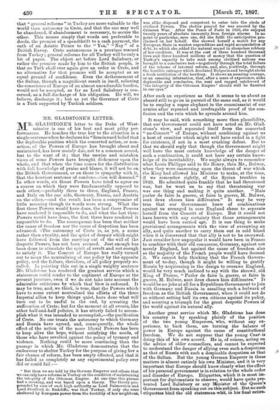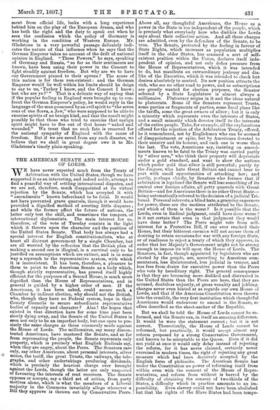MR. 6-LADSTONE'S LETTER.
MR. GLADSTONE'S letter to the Duke of West- minster is one of his best and most pithy per- formances. He touches the true key to the situation in a single sentence when he declares his "firm inward belief that the deplorable position which the concerted action, or non- action, of the Powers of Europe has brought about and maintained, has been mainly due, not to a common accord, but to the want of it ; that the unwise and mistaken -views of some Powers have brought dishonour upon the whole, and that when the time comes for the-distribution with full knowledge of praise and blame, it will not be on the British Government, or on those in sympathy with it, that the heaviest sentence of condemnation will descend.' In other words, six Great Powers have tried to agree on a course on which they were fundamentally opposed to each other,—probably three to three, England, France, and Italy on the one side, Germany, Russia, and Austria on the other,—and the result has been a compromise of little meaning though its words were strong. What the first three Powers would have done, the last three Powers have rendered it impossible to do, and what the last three Powers would have done, the first three have rendered it impossible to do. The consequence has been that neither the cause of freedom nor the cause of despotism has been _advanced. \ The autonomy of Crete is, as yet, a name rather than alreality, and the quiet of despair which might have followed from the carrying out of the will of the despotic Powers, has not been secured. Just enough has been done to stimulate the spirit of revolt and not enough to satisfy it. The Concert of Europe has really turned out to mean the neutralising: of one policy by the opposite policy, and the failure, therefore, of all policy properly so- called. In pointing this out ia a single weighty sentence Mr. Gladstone has rendered the greatest service which a statesman could render to the coptinent of Europe at the present juncture, even if we do nbt take into account the admirable criticisms by which that' -View is enforced. It may be true, and, we think, is true, that the Powers which have to some extent neutralised the effOrts of the three Imperial allies to keep things quiet, have done what will turn out to be useful in the end, by arresting the suffocation of Crete; but for the moment at all events, like -other half-and-half policies, it has utterly failed to accom- plish what it was intended to accomplish,—the pacification of Crete. No one trusts the autonomy to which Germany and Russia have agreed, and, consequently, the whole effect of the action of the more liberal Powers has been to keep alive the hope, without satisfying the needs, of those who have revolted against the policy of tyranny and violence. Nothing could be more convincing than the passage in which Mr. Gladstone demonstrates that the -endeavour to shelter Turkey for the purpose of giving her a fair chance of reform, has been amply effected, and that it has failed as completely as any experimental policy ever -did or could fail :— " Bat then we are told by the German Emperor and others that we can only have reforms in Turkey on the condition of maintaining the integrity of the Ottoman Empire. At one time this phrase had a meaning, and was based upon a theory. The theory pro- pounded by men'of such high authority as Lord Palmerston and Lord Stratford de Radcliffe, was that Turkey, if only she were sheltered by European power from the hostility of her neighbout; was alike disposed and competent to enter into the circle of civilised Powers. The shelter prayed for was assured by the Crimean War. After the Peace of Paris in 1856, she enjoyed twenty years of absolute immunity from foreign alarms In no point or particular, save one, did she fulfil the anticipation pro- claimed on her behalf. She showed herself a match for any European State in wanton expenditure and rapid accumulation of debt, to which she added the natural sequel in shameless robbery of her creditors. It was at the cost of three hundred thousand lives and three hundred millions of money that the question of Turkey's capacity to take rank among civilised nations was brought to a conclusive test—negatively through the total failure of the scheme of internal reform, and, alas, positively, through the horrible outrages which desolated Bulgaria and brought about a fresh mutilation of the territory. It shows an amazing courage, or an amazing infatuation, that, after a mass of experience, alike deplorable and conclusive, the rent and ragged catchword of 'the integrity of the Ottoman Empire' should still be flaunted in our eyes."
After such an experience as that it seems to us about as absurd still to go on in pursuit of the same end, as it would be to employ a rogue elephant in the commissariat of our armies after repeated and irrefragable proof of the con- fusion and the ruin which he spreads around him.
It may be said, with something more than plausibility, that our Government could not have acted on Mr. Glad- stone's view, and separated itself from the concerted " no-Concert " of Europe, without combining against us a host of enmities which might well have ended in a fight for existence' if not in a most crushing defeat. But to that we should reply that though the Government might well have the most certain knowledge of the danger of such a combination, it could not have any certain know- ledge of its inevitability. We ought always to remember what Louis Philippe said to Sir Henry, then Mr., Bulwer, when they were conversing upon the threat of war which the King had allowed his Minister to make, at the time, if we remember rightly, of the Syrian troubles in 184Q. He admitted quite frankly that he had threatened war, hut.- went on to say that threatening war was one laiug and making it quite another. " Mais parler de faire la guerre, et faire la guerre, M. Bulwer, sont deux choses bien differentes." It may be very true that our Government knew of combinations against us arranged .in case England chose to separate herself from the Concert of Europe. But it Could not have known with any certainty that those arrangements would have been carried out. It is one thing to make provisional arrangements with the view of overawing an ally, and quite another to carry them out in cold blood when it is discovered that that ally is not to be overawed. Just consider how unpopular it would have been in France to combine with their old conqueror, Germany, against not merely England, but against the cause of freedom also as the majority of the French people woulct have deemed it. We cannot help thinking that the French Govern- ment of to-day, though it might be willing to gratify Russia by acquiescing in the design to overawe England, would be very much inclined to say with the shrewd, old King of France, " Parler de faire la guerre, et faire la guerre, M. Bulwer, sont deux choses bien differentes." It would be no joke at all for a Republican Government to join with Germany and Russia in assailing such a bulwark of freedom as the British Government, when it could not do so without setting half its own citizens against its policy, and securing a triumph for the great despotic Powers of the world against its natural ally.
Another great service which Mr. Gladstone has done his country is by speaking plainly of the position of the two young Emperors, 'who, without any ex- perience; to back them, are turning the balance of power in Europe against the cause of constitutional freedom. We do not suppose that the young- Czar-is doing this of his own accord. He is of course, acting on the advice of older counsellors, and cannot be expected to understand the danger of allying even such a despotism as that of Russia with such a despicable despotism as that of the Sultan. But the young German Emperor in these matters is almost entirely his own Minister, and it is very important that Europe should know clearly what the effect of his personal government is in relation to the whole order and disorder of Europe. Etiquettes,‘ which it is most im- portant for diplomatists to observe, would have quite pre- vented Lord Salisbury or any Meister of the Queen's Government gromapeaking -out on thisobjeat. Butno such etiquettea bind the old statesmamivh% in his-final retire= ment from official life, looks with a long experience behind him on the play of the European drama, and who has both the right and the duty to speak out when he sees the confusion which the policy of Germany is working in the condition of Western Europe. Mr. Gladstone in a very powerful passage delicately indi- cates the nature of that influence when he says that the German Emperor takes no account of the drift of national opinion in England. "These Powers," he says, speaking of Germany and Russia, "so far as their sentiments are known, have been using their power in the Concert to light steadily against freedom. But why are we to have our Government pinned to their aprons ? The sense of this nation is for them non-existent : and the German Emperor would lie well within his limits should he deign to say to us, Turkey I know, and the Concert I know ; but who are ye 2'" That is a delicate way of saying that if the popular feeling in England were brought up to con- front the German Emperor's policy, he would reply in the language of the man possessed by an evil spirit to "the seven sons of one Sceva, a Jew," who were supposed to be able to exorcise spirits of no benign kind, and that the result might possibly be that those who tried to exorcise that malign spirit might have to flee out of that house "naked and wounded." We trust that no such fate is reserved for the national sympathy of England with the cause of freedom. But if we are saved from any such disaster, we believe that we shall in great degree owe it to Mr. Gladstone's timely plain-speaking.







































 Previous page
Previous page